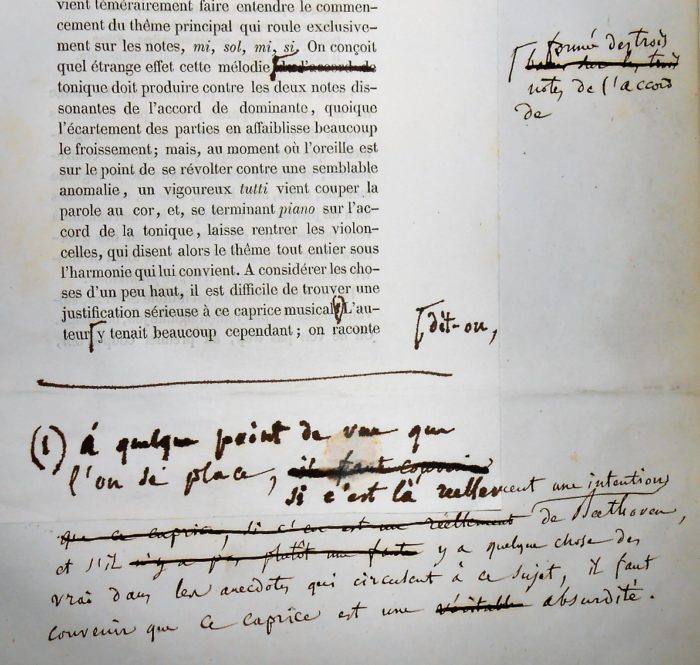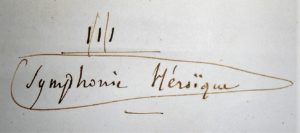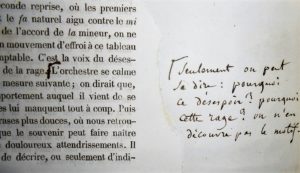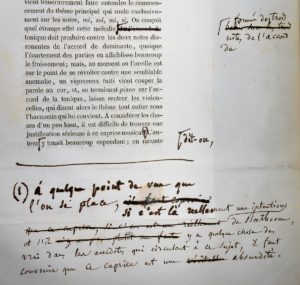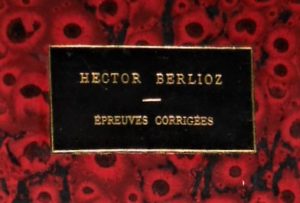Hector Berlioz (1803-1869). III. Heroic Symphony. Proofs with the composer’s autograph corrections. No place, no date [ca. 1862]. 10 pp. in-8° glued on sheets in-4° mounted on guards. Antique binding of red paper boards, black morocco title piece on the cover. .
Berlioz used the edition of his Voyage musical en Allemagne et en Italie. Études sur Beethoven, Gluck et Weber. Mélanges et Nouvelles, published in 1844 by J. Labitte in Paris, volume I, pp. 279 to 288. This “analytical study” dedicated to theHeroic, will be taken back, with corrections noted in ink, under the title of “Critical Study of Beethoven’s Symphonies”, in À travers Champs, Études musicales, adorations, boutades et critiques par Hector Berlioz, by Michel Lévy Frères, Paris, 1862, chapter III, pp. 20 to 26.
The composer tore, sometimes awkwardly, then glued each page of the edition of 1844, one side then the other, and noted his ink corrections on the page itself, often overflowing on the support sheet.
Some corrections are one-throw: ” Only we can say to ourselves : why this despair? why this rage ? we do not discover the reason. ” (p. 2), others have some hesitations: “We can imagine what a strange effect this melody has. [based on all three delete] formed by the three notes of the chord of tonic must produce against the two dissonant notes of the dominant chord […] ” (p. 3) ;
“to what point of view that one places oneself, [it is necessary to agree delete] if that is really an intention [that this whim, if it is actually one delete] of Beethoven, and if there [is not rather a fault delete] is something true in the anecdotes circulating about it, it must be agreed that this whim is a [genuine delete] absurdity. ” (p. 3). Note, p. 8, the correction of “a superhuman creation” in “of such a noble composition “, as well as the deletion of “for Napoleon”, certainly, e [the music] did not exist”, criticism in the zeitgeist of the July Monarchy not in agreement with L’Impériale, hymn in honor of Napoleon III, that he had composed for the Universal Exhibition in 1855.
Berlioz wrote in Les Grotesques de la musique : “Beethoven is a Titan, an Archangel, a Throne, a Domination. Seen from the top of his work, the rest of the musical world seems Lilliputian. He was able to, he even had to paraphrase the apostrophe of the Gospel, and say : ” Men, what is there in common between you and me ? ” »
“Heir presumptive” of the Master of Bonn, as Liszt had called him, Berlioz would have entrusted to Fétis: “I picked up the music where Beethoven left it”, composing his Symphonie Fantastique in response to theHeroic.
Autograph revisions of his analysis, then at the top of his art, are all the more valuable .
Note some handwritten notes in ink by another hand, probably the printer: “Hèques [?] ” and “Letellier “, and others in gray pencil, of which “1-68, 15 surch[arges ?] “
Binding slightly rubbed.
Exceptional document.
3 500 €
